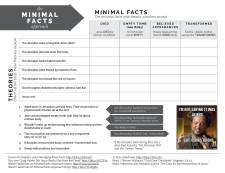I think my moral argument for God’s existence is similar to Leibniz’ cosmological argument (except it has to do with the explanation of the Good, a.k.a. the Golden Rule).
If you’d rather not say “the Golden Rule,” then say what everyone else says: “objective moral values and duties.” If it isn’t obvious, I took my phrasing from William Lane Craig.
1. Everything that exists has an explanation of its existence, either in the necessity of its own nature or in an external cause.
2. If the Golden Rule has an explanation for its existence, that explanation is the same explanation for God’s existence: the necessity of His own nature.
[That statement is logically equivalent to the atheist’s own statement that if God does not exist, a) the Golden Rule has no explanation for its existence (or does not exist), or b) the Golden Rule exists by the necessity of its own nature (only a personal being can have a necessary nature that is described by the Golden Rule). Now, if the atheist would rather claim that the Golden Rule is a social construct and that different cultures will come up with different values and duties, they must account for premise 3. However, if the atheist accounts for premise 3 by claiming that the Golden Rule is a natural construct common to all humans, and thus all cultures, that is (again) logically equivalent to premise 2, but doesn’t jive with our moral intuitions–it equates to claiming the universe doesn’t really exist.]
3. The Golden Rule exists (is discovered independently) in various forms in every major culture in history.
4. Therefore, the Golden Rule has an explanation for its existence (from 1 and 3).
5. Therefore, the explanation of the existence of the Golden Rule is the same explanation for God’s existence: the necessity of His own nature (from 2 and 4).
Related: Resolving Euthyphro’s Dilemma










